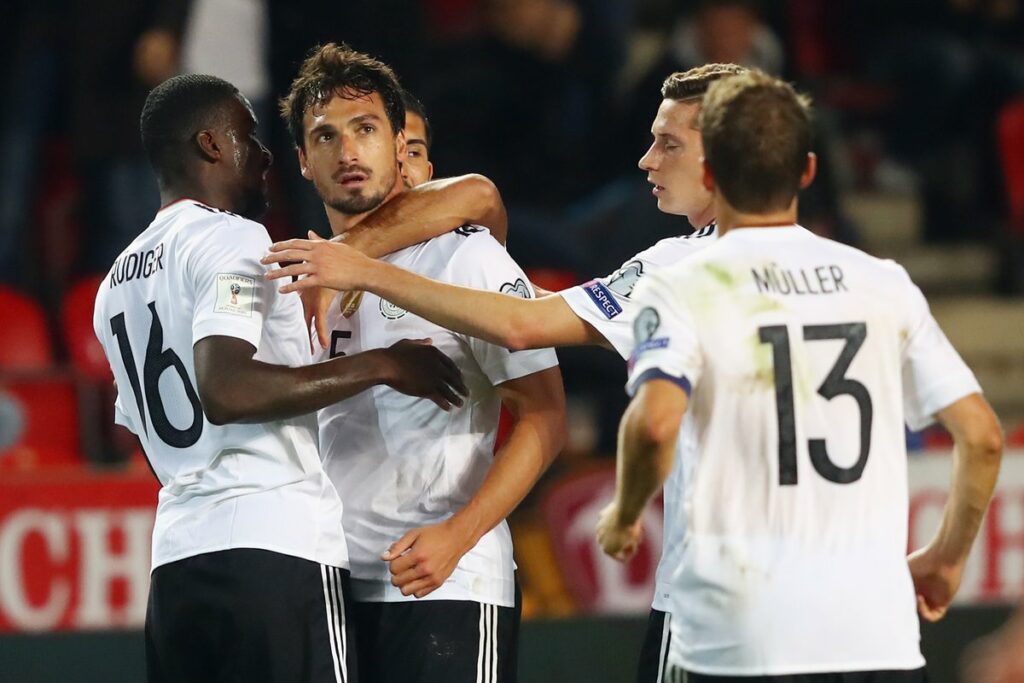The right things have been said, but the question now becomes whether more will be done to address an ongoing problem

Per German outlet DW, the end of Germany’s 2-1 victory at the Czech Republic heard the usual chants of “Sieg!,” or “victory,” followed by chants of “heil!” by the around 200 neo-Nazis that attended the match. In response, the German national team did not clap the traveling fans, instead heading straight for the tunnel. Manager Joachim Löw at first refused to speak about it, saying he had not heard the chants. A few days later, ahead of Germany’s match against Norway, he addressed the issue.
“We don’t want these idiots. We’re not their national team, and they’re not our fans,” were just some of the condemning words he had for them. He said he was “full of rage” and called the actions “a hugely embarrassing display.” From an American perspective, and considering certain prominent people have found it difficult to condemn Nazism and hatred in general, I find the comments refreshing.
Germany will be hoping there is no repeat of the unsavory chants which marred Friday’s match.
Full story: https://t.co/d02uLGBf3K pic.twitter.com/e9Iw1RV7Xp
— DW Sports (@dw_sports) September 4, 2017
In times when Mark Sampson can get off the hook for racially abusing Eniola Aluko, soccer is providing little escape for the many searching for it. Truth be told, one would be hard pressed to find a lot of soccer teams or players speaking out about the injustices that directly and indirectly impact them.
This, coupled with the demand that fans attending the Norway match not engage in such chants from the German Football Association (DFB) and Stuttgarter Zeitung, a newspaper based in Stuttgart—the city that hosted the match—is a strong first step in tackling the issue. By the looks of reports following Germany’s 6-0 drubbing of Norway, or lack thereof, the problem seemingly did not recur. That being said, while it is a good start, more needs to be done.
As Timo Werner put it, geography may have kept the neo-Nazis away from the match in Stuttgart, making the DFB the benefactor of such obstacles, but not the cause. “You know what’s not far from Prague, so you can do the math yourself,” Werner said following the match in Prague, speaking about the eastern German cities that are close to the Czech capital. These cities have high populations of people who support right-wing political parties. According to many German reports, the neo-Nazis in attendance on Friday are associated with clubs in these cities, such as Dynamo Dresden and FSV Zwickau.
Condemnation of blatant hate is obviously a good thing, but it’s only a start. DFB president Reinhard Grindel wrote a lengthy statement on Facebook a day after the match, first applauding the players for rejecting the neo-Nazis in the stands, but eventually calling upon the federation to do something. The end of his Facebook post, in a rough Google translation from German to English, reads: “We appreciate the support of the peaceful viewers for [the team]. But we will never tolerate fascist, racist, insulting and homophobic calls or violence. Together—as a team, fans and DFB—we have to face these rioters.” Other than calling upon those in attendance for the match in Stuttgart not to repeat what happened in Prague, there has not been much action by the DFB.
The DFB could open investigations and attempt to identify the individual fans and ban them from all official matches, as they’ve already been banned from matches in Germany. In the past, several clubs have done this, sometimes with the assistance of local police. On Wednesday, FIFA announced that they would do just that themselves, opening disciplinary cases against Germany and the Czech Republic. Additionally, UEFA could step in and make Germany play in empty stadiums, a punishment UEFA in particular has used from time to time in the past. UEFA has yet to speak out about the matter.
Of course, the incident did only happen days ago, and solving a problem like this is something will take longer than a few days to solve. It’s not a new problem, though. The aforementioned DW report noted several instances when neo-Nazis have presented German soccer in a negative light, including incidents at the 1998 World Cup and the 2016 European Championships in which the neo-Nazis were violent. The 1998 incident ended with a French police officer being beaten into a coma. Last year’s episode saw them attack Ukrainian supporters and pose with a Reichskriegsflagge—the flag the German armed forces used from 1867 to 1945.
Clearly, the German national team has a problem on their hands, one that is not new and has not gone unnoticed. The onus is now on them, though, to do more. Public scoldings are not enough, and no one should trust FIFA to take the necessary steps to end this type of discrimination just under a year after they ended their anti-racism task force and then reinstated it after backlash.
It will be fascinating to follow the DFB’s actions in the coming days as they have the chance to outperform the many who have not done enough in the face of hateful and harmful behavior. Maybe they can set a high standard and an example for others to follow.
Follow Pardeep on Twitter @pcattry.
